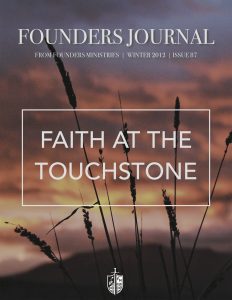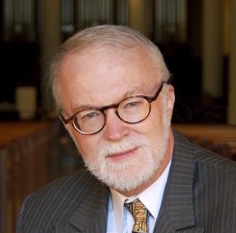An Interview
Your book, Reading Scripture with the Reformers, is the companion volume for the Reformation Commentary on Scripture series (InterVarsity Press). Before we talk about the book, I’d like to ask about this larger project, for which you serve as General Editor. Can you speak a bit about the genesis of this series and how you came to be involved in it?
Several years ago InterVarsity Press began a series called the Ancient Christian Commentary on Scripture. The General Editor was Tom Oden. It was a collection of volumes looking at the early church Fathers and their view and exegesis of Scripture. Well, that series is now completed and there was a view both at InterVarsity Press and in some of the interviews that were done in response to that series that it would be great if we had something similar to this on the period of the Reformation. So the Reformation Commentary on Scripture (RCS), is really a sequel series to the Ancient Christian Commentary on Scripture.
We think it is important that we not leapfrog over the Reformation in going back to the early church, especially those of us who stand in the Protestant and Evangelical tradition. We have to come to grips with the Reformers. So this, in a way, is a project that is intended to make the exegetical writings of the 16th century Reformation accessible and available to pastors and teachers of the church today.
You have written widely on Reformation issues through the years, most notably in your Theology of the Reformers. I’m curious to know if you would object to this project being called your magnum opus? I ask because this would seem to be a career-defining project and the culmination of a great deal of work spanning a number of years in which you have been exploring Reformation theology.
I think that’s for other people to say and not myself. I consider it a very important and, obviously, long enduring work. We hope to bring out, say, three volumes a year, beginning this year–2011–with our very first volume and then bringing out two or three volumes a year up to the completion of the project, twenty eight volumes. So it will take a big chunk of my life if God gives me that much longer to live.
It is in some ways, I would say, the culmination of a lot of thought and the investment of a lot of scholarship and work I’ve done on the Reformation over the years. More importantly, I think it’s of real service to the church and, in that way, for ministry.
Reading Scripture with the Reformers is a carefully reasoned and compellingly argued plea for modern interpreters of Scripture to consider the wisdom of exploring and excavating the vast exegetical and hermeneutical mines of the Reformation. Is it reasonable to expect busy men and women to become acquainted with Reformation exegesis? Is this project an effort to make these treasures more accessible to modern people?
Yes, it is reasonable to expect that busy men and women become acquainted with Reformation exegesis. That is, if those particular people have been called and charged by the church of Jesus Christ to be teachers and proclaimers of the Word. Paul says, “We don’t preach ourselves, but Christ Jesus the Lord.” That kind of mandate requires nothing less than the very best preparation, the deepest kind of serious study possible.
J.I. Packer, my good friend and mentor in so many ways, has quipped that “American Evangelicalism is three thousand miles wide and one inch deep.” Well, I’m not saying that’s always true because there are exceptions to that, but I think this project is intended to enrich the preaching and teaching ministries of the churches today. And I would say if you’re not willing to invest significant time and energy and thought and preparation in your sermons, including digging into the exegetical wisdom of the church in ages past, then you probably shouldn’t be in the business of proclaiming and teaching the Word of God. Go sell car insurance! Do something more profitable than preaching. So I don’t have a lot of patience with, “I’m too busy. I don’t have time for that.” Then choose another line of work. That’s what I would say to people like that.
However, we should not expect every working pastor to be a research scholar in the early church and the Reformation. That would be an unreasonable expectation. So, in fact, this commentary is intended to take some of the exegetical treasury of the Reformation and make it accessible, available to hard working, busy pastors and church leaders and teachers today. That’s exactly what we’re trying to do.
You note that “it is ironic that the Reformation principle of sola scriptura, though much misunderstood, has led to the neglect among Protestants of the biblical commentaries of the reformers” (p.22). This is indeed ironic. Are you suggesting that the principle of sola scriptura, when perverted, tends to exalt individuals’ confidence in their own isolated interpretations to the point that they no longer feel the need for the voices of the past? If so, does sola scriptura have a tendency to cut its own throat?
Yes, and that’s because sola scriptura is frequently misunderstood and degraded into what I’ve called before nuda scriptura. James Leo Garrett, a great teacher and scholar long associated with Southwestern Seminary, has talked about sola scriptura as scriptura suprema. What that means is that the Bible, the written Word of God, is the touchstone by which everything else–all the creeds, councils and theologies of the ages–have to be tested. It doesn’t mean that we are at liberty just to ignore everything that has been said and done. In fact, that is a sign of arrogance, of incredible hubris, to think that you can come to the Scriptures in total isolation from what God has been saying to the church through the ages.
So I do think sola scriptura can be and has been misinterpreted and misunderstood. We still have to hold on to that principle, however, because God has revealed Himself to us uniquely and authoritatively and normatively in His written Word. That is the touchstone of Reformation exegesis.
Gutenberg’s invention stands at the center of the Reformation. Was the Reformation to some extent a technological revolution?
Yes, a typographical revolution we might say. It was, in fact, Gutenberg’s amazing ditto device, the printing press, that enabled the Scriptures to be so widely disseminated. Prior to the invention of the printing press, it took upwards of one year for a complete copy of the Bible to be made by a scribe in a scriptorium working by hand: line by line, letter by letter, page by page. Now, almost overnight, that changes with Gutenberg. So it clearly affected the whole way in which communication took place, in which education was done and the dissemination of the Scriptures.
Once the Bible began to be translated it was possible for many, many people to have copies–their own copies–of the Bible. That would have been unheard of prior to Gutenberg. There were very few Bibles, complete Bibles, anywhere, except maybe in some of the universities and cathedrals. Often they were chained, not to keep people from reading them but so they wouldn’t be stolen, the way we used to chain telephone directories in phone booths. You’re probably too young to remember that, Wyman. There used to be such a thing as a phone booth and there was a phone book in it that was actually chained so that people would not walk away with it. That’s the same thing with the Bible prior to the invention of the printing press. You don’t want to say that there would have been no Reformation without Gutenberg, but you do have to say that the Reformation would not have taken off and had such a profound and widespread effect without this typographical revolution.
I was struck by the eerie similarity between Noel Beda’s arguments for the Vulgate (p.73) and arguments you sometimes encounter in certain extreme manifestations of the “KJV-only” movement today. Is it fair to say that every age has people arguing for one perfect, static translation?
Yes. One of the foundational charter principles of Christianity and of the Bible is its translatability. Christians believe the Bible can be translated into any language human beings can speak. That’s different from Islam. Muslims believe that the Qu’ran was revealed to Muhammad in Arabic and only in Arabic is it the authoritative, inspired word of God according to Muslims.
Christians don’t accept that principle. The Bible was written in Greek and Hebrew and a little Aramaic, but from the beginning we see the Bible being translated into the various languages of the Roman Empire. Later there was the Vulgate, the official Latin translation of the Bible made by St. Jerome in the early church. One thing you have to say for the Vulgate: it had the longest run of any one, single translation, over a thousand years in the Christian West. The Vulgate was really the one and only normative text of the Bible. So when the Reformation came along at the time of the Renaissance, you had the recovery of classical antiquity, you had new manuscripts being found, you had Erasmus’ critical edition of the Greek New Testament in 1516. There was a resistance against translating the Scriptures into any of the vernacular languages.
Why? Well, part of it was because people were afraid of the Bible. If you let the Bible loose there’s no telling what might happen. There was a genuine fear that there would be a kind of revolutionary, rabble-rousing, even violent response if you gave people the Scriptures to read in their own tongue. But, when we look back on it now, we can see that God was indeed at work in the whole process of the Reformation: the printing press, the recovery of classical antiquity, the translation of the Bible (Luther translated it into German, William Tyndale into English and others in all of the vernaculars of Europe). This really was one of the lasting legacies of the Reformation.
I could not help but think, while reading the book, of some of the current debates surrounding the idea of biblicism. I’m thinking, for example, of the debate between Robert Gundry and Christian Smith in the last couple of issues of Books and Culture on the issue of biblicism. I’m curious to know if you see the Reformation principle of sola scriptura as being roughly synonymous with the idea of biblicism. Would Luther have considered himself a biblicist in the same way that, say, a Baptist today might employ the term?
It’s a slippery term, biblicism. It’s like all these terms we use: fundamentalism, I can think of a hundred others. What do these words mean? If by biblicist you mean a person who takes their anchorage in the written Word of God, that Scripture is the norma normans, the norm by which all other norms must be normed, that, as we Baptists like to say, the Bible is our only rule for faith and practice–if that’s what you mean by biblicism then, yes, Luther was one and I think we ought to be exactly the same.
However, I think that biblicism is sometimes meant in a much more narrow sense than that. Biblicism, for some people, means you don’t approach the Bible with all of the scholarly tools available, that you simply read it in a vacuum, as it were, ahistorically. If something like that is what is meant by biblicism then it is a perversion of the Reformation principle of sola scriptura.
Do you want to follow up on that? I’m not sure exactly how biblicism is functioning in that question.
Well, I think you’ve answered the question well. Biblicism, as I hear it referred to, often refers to the idea of an eisegetical imposition of a system, that our systems somehow taint our reading of Scripture.
Well here’s the thing: when you open your Bible you bring something with you. We should not imagine that we are sitting or standing on a kind of independent epistemological platform in which everything can be judged in a kind of omniscient objectivity. No, we bring to the reading of the text the things that have shaped us, whether that’s the modern worldview, whether that’s some prejudice we’ve picked up in Sunday School when we were kids, whatever that is. We bring that to the text and we only deceive ourselves if we think we are exempt from that.
Now, one of the reasons why reading Scripture with the Reformers is so important is that it allows us to check our own prejudices against the reading and exegesis of other godly men of the past. That doesn’t mean their interpretation is always right. They were certainly not infallible. They could be dead wrong. But it’s always good to have several voices in this conversation. That’s why we need to read the Reformers and see how this text struck them, what they made of it, and then bring that back into our own context with our own prejudices and presuppositions. I think that’s a better way forward in Bible study.
You draw attention to some lesser known Reformation figures like Matthias and Katarina Zell. Did you make an intentional effort to introduce the reader to lesser known figures like these? Do you think there are a number of important figures that have been overshadowed by the major lights of the Reformation?
Yes. One of my great Reformation teachers was Dr. David Steinmetz who’s been at Duke for many years. He was a visiting professor at Harvard when I was there and I was privileged to study with him for one year. He wrote a book entitled Reformers in the Wings some years ago. There are many, you might say, minor characters in the Reformation. At least they’re on the sidelines. They’re not in the spotlight like Luther and Calvin and Cranmer and the great ones that we always think about. But they made a profound contribution to the Reformation and to the recovery of the Bible in the Reformation.
So in this project, the Reformation Commentary on Scripture, we are intentionally drawing on the breadth of Reformation exegesis. It’s not just going to be twenty-eight volumes of Luther and Calvin. You’ll find a lot of Luther and Calvin in every volume, I assure you, because they’re such massively important figures and had so much to say about the Bible. But we also have a lot of the other lesser luminaries, including the two you mentioned, Matthias and Katarina Zell.
Matthias Zell was a Dominican friar. He embraced the Reformation and became the first preacher of the Protestant Reformation in the city of Strasbourg. Katarina Zell, his wife, was an amazing woman herself. She wrote a number of treatises and also hymns. She conducted funeral services for the Anabaptists. She was an incredible person. So these were figures who played a very decisive role in the going forward, the progress of the Reformation in the 16th century and sometimes even contributing to our understanding of the text itself through their commentaries and treatises. So, yes, we’re trying to bring these people in from the shadows, so to speak, and give them a little bit of limelight because they’re part of the story.
You refer to the “Word in Scripture” and the “living Word Jesus Christ” as “the two poles of Reformation theology” (p.258). Do you believe that the Reformation reclamation of Scripture successfully freed the gospel for a fresh hearing, or is that an oversimplification?
I actually like the way you put that: the Reformation reclamation of Scripture. We have to keep in mind that the Reformers were not about starting anything new. They were about reclaiming, retrieving something they felt had become obscured in the course of the medieval period. So they wanted to go back to the New Testament, back to the early church Fathers, and scrub off all of the barnacles that had attached to the good ship church during that period of time. It wasn’t just repristinization for the sake of being old fashioned. It was rather that they wanted to carry on this project of reclamation so that the gospel could shine forth more clearly. That’s what was at stake. And though we live in a very different context, that’s also what’s at stake today.
So I’d like to join that project. I’d like for other churches today to read the Reformers, not because they have the final word on everything but because their intention was to return to the Scriptures, to return to the gospel and, above all, to return to Jesus Christ, as you say to free the gospel for a fresh hearing.
Thank you, Dr. George, for this very helpful book and for your work on the Reformation Commentary on Scripture project.
















